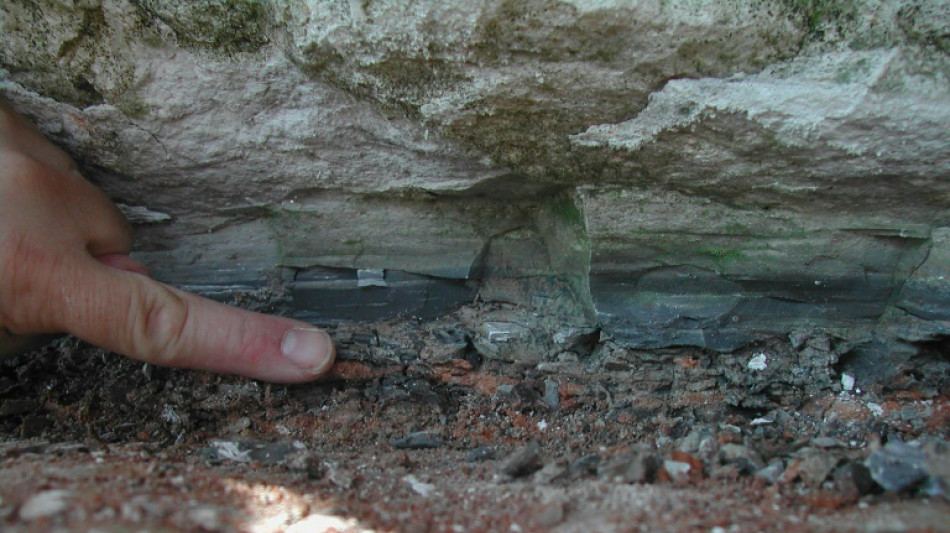
-
 Gauff-led holders USA to face Spain, Argentina at United Cup
Gauff-led holders USA to face Spain, Argentina at United Cup
-
Ecuador voters reject return of US military bases

-
 Bodyline and Bradman to Botham and Stokes: five great Ashes series
Bodyline and Bradman to Botham and Stokes: five great Ashes series
-
Iran girls kick down social barriers with karate

-
 Asian markets struggle as fears build over tech rally, US rates
Asian markets struggle as fears build over tech rally, US rates
-
Australia's 'Dad's Army' ready to show experience counts in Ashes

-
 UN Security Council set to vote on international force for Gaza
UN Security Council set to vote on international force for Gaza
-
Japan-China spat sinks tourism stocks

-
 Ecuador voters set to reject return of US military bases
Ecuador voters set to reject return of US military bases
-
Trump signals possible US talks with Venezuela's Maduro

-
 Australian Paralympics gold medallist Greco dies aged 28
Australian Paralympics gold medallist Greco dies aged 28
-
Leftist, far-right candidates go through to Chilean presidential run-off

-
 Zelensky in Paris to seek air defence help for Ukraine
Zelensky in Paris to seek air defence help for Ukraine
-
Bangladesh verdict due in ex-PM's crimes against humanity trial

-
 A pragmatic communist and a far-right leader: Chile's presidential finalists
A pragmatic communist and a far-right leader: Chile's presidential finalists
-
England ready for World Cup after perfect campaign

-
 Cervical cancer vaccine push has saved 1.4 million lives: Gavi
Cervical cancer vaccine push has saved 1.4 million lives: Gavi
-
World champion Liu wins Skate America women's crown

-
 Leftist leads Chile presidential poll, faces run-off against far right
Leftist leads Chile presidential poll, faces run-off against far right
-
Haaland's Norway thump sorry Italy to reach first World Cup since 1998

-
 Portugal, Norway book spots at 2026 World Cup
Portugal, Norway book spots at 2026 World Cup
-
Sinner hails 'amazing' ATP Finals triumph over Alcaraz

-
 UK govt defends plan to limit refugee status
UK govt defends plan to limit refugee status
-
Haaland's Norway thump Italy to qualify for first World Cup since 1998

-
 Sweden's Grant captures LPGA Annika title
Sweden's Grant captures LPGA Annika title
-
Tuchel lays down law to Bellingham after England star's frustration

-
 Sinner caps eventful year with ATP Finals triumph over great rival Alcaraz
Sinner caps eventful year with ATP Finals triumph over great rival Alcaraz
-
Portugal book spot at 2026 World Cup as England stay perfect

-
 Hakimi, Osimhen, Salah shortlisted for top African award
Hakimi, Osimhen, Salah shortlisted for top African award
-
Sinner beats great rival Alcaraz to retain ATP Finals title

-
 Schenk wins windy Bermuda Championship for first PGA title
Schenk wins windy Bermuda Championship for first PGA title
-
Crime, immigration dominate as Chile votes for president

-
 Kane double gives England record-setting finish on road to World Cup
Kane double gives England record-setting finish on road to World Cup
-
World champions South Africa add Mbonambi, Mchunu to squad

-
 Greenpeace says French uranium being sent to Russia
Greenpeace says French uranium being sent to Russia
-
'Now You See Me' sequel steals N. American box office win

-
 Argentina beat Scotland after frenzied fightback
Argentina beat Scotland after frenzied fightback
-
Argentina beat Scotland after stunning fightback

-
 Pope urges leaders not to leave poor behind
Pope urges leaders not to leave poor behind
-
Pressure will boost Germany in 'knockout' Slovakia clash, says Nagelsmann

-
 Ecuador votes on hosting foreign bases as Noboa eyes more powers
Ecuador votes on hosting foreign bases as Noboa eyes more powers
-
Portugal qualify for 2026 World Cup by thrashing Armenia

-
 Greece to supply winter gas to war battered Ukraine
Greece to supply winter gas to war battered Ukraine
-
India and Pakistan blind women show spirit of cricket with handshakes

-
 Ukraine signs deal with Greece for winter deliveries of US gas
Ukraine signs deal with Greece for winter deliveries of US gas
-
George glad England backed-up haka response with New Zealand win

-
 McIlroy loses playoff but clinches seventh Race to Dubai title
McIlroy loses playoff but clinches seventh Race to Dubai title
-
Ecuador votes on reforms as Noboa eyes anti-crime ramp-up

-
 Chileans vote in elections dominated by crime, immigration
Chileans vote in elections dominated by crime, immigration
-
Turkey seeks to host next COP as co-presidency plans falter


Scientists pinpoint dino-killing asteroid's origin: past Jupiter
An intense debate surrounding the cosmic rock that killed the dinosaurs has stirred scientists for decades, but a new study has revealed some important -- and far-out -- data about the impactor's origin story.
Researchers, whose findings were published Thursday in the journal Science, used an innovative technique to demonstrate that the apocalyptic culprit which slammed into the Earth's surface 66 million years ago, causing the most recent mass extinction, had formed beyond Jupiter's orbit.
They also refute the idea that it was a comet.
The new insights into the apparent asteroid that cratered into Chicxulub, in what is present-day Mexico's Yucatan Peninsula, could improve the understanding of celestial objects that have struck our planet.
"Now we can, with all this knowledge... say that this asteroid initially formed beyond Jupiter," Mario Fischer-Godde, lead author of the study and a geochemist at the University of Cologne, told AFP.
The conclusions are particularly notable, given how rarely this type of asteroid collides with Earth.
Such information may well prove useful in assessing future threats, or determining how water arrived on this planet, Fischer-Godde said.
- Samples -
The new findings are based on analysis of sediment samples formed at the period between the Cretaceous and Paleogene eras, the time of the asteroid's cataclysmic impact.
Researchers measured the isotopes of the element ruthenium, not uncommon on asteroids but extremely rare on Earth. So by inspecting the deposits in multiple geological layers that mark the debris from the impact at Chicxulub, they could be sure that the ruthenium studied came "100 percent from this asteroid."
"Our lab in Cologne is one of the rare labs that can do these measurements," and it was the first time such study techniques were used on impact debris layers, Fischer-Godde said.
Ruthenium isotopes can be used to distinguish between the two main groups of asteroids: C-type, or carbonaceous, asteroids that formed in the outer solar system, and S-type silicate asteroids from the inner solar system, nearer the sun.
The study affirms that the asteroid that triggered a mega-earthquake, precipitated a global winter and wiped out the dinosaurs and most other life, was a C-type asteroid that formed beyond Jupiter.
Studies from two decades ago had already made such an assumption, but with far less certainty.
The conclusions are striking, because most meteorites -- pieces of asteroids that fall to Earth -- are S-types, Fischer-Godde pointed out.
Does that mean the Chicxulub impactor formed beyond Jupiter and made a beeline for our planet? Not necessarily.
"We cannot be really sure where the asteroid was kind of hiding just before it impacted on Earth," Fischer-Godde said, adding that after its formation, it may have made a stopover in the asteroid belt, located between Mars and Jupiter and where most meteorites originate.
- Not a comet -
The study also dismisses the idea that the destructive impactor was a comet, an amalgam of icy rock from the very edge of the solar system. Such a hypothesis was put forward in a much-publicized study in 2021, based on statistical simulations.
Sample analyses now show that the celestial object was far different in composition from a subset of meteorites which are believed to have been comets in the past. It is therefore "unlikely" the impactor in question was a comet, Fischer-Godde said.
As to the wider usefulness of his findings, the geochemist offered two suggestions.
He believes that more accurately defining the nature of asteroids that have struck Earth since its beginnings some 4.5 billion years ago could help solve the enigma of the origin of our planet's water.
Scientists believe water may have been brought to Earth by asteroids, likely of the C-type like the one that struck 66 million years ago, even though they are less frequent.
Studying past asteroids also allows humanity to prepare for the future, Fischer-Godde said.
"If we find that earlier mass extinction events could also be related to C-type asteroid impacts, then... if there's ever going to be C-type asteroid on an Earth-crossing orbit, we have to be very careful," he said, "because it might be the last one we witness."
E.AbuRizq--SF-PST




